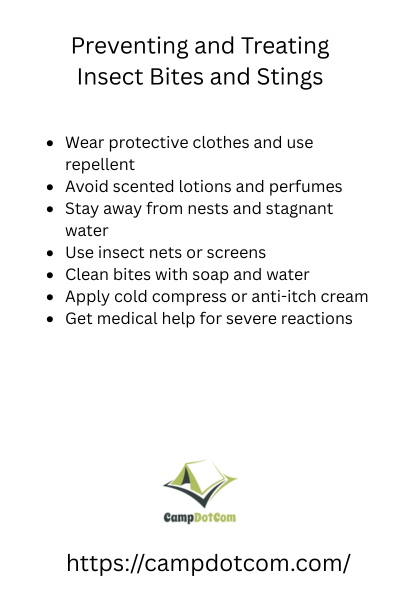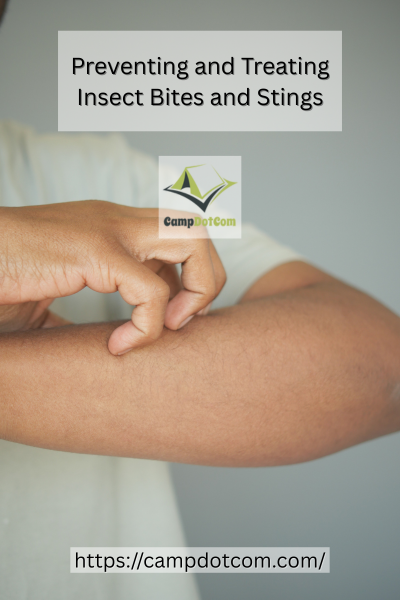Preventing and treating insect bites and stings is something you don’t really think about until you’re scratching like crazy or swatting at the air like a maniac. I’ve learned the itchy way that a little preparation can save you from a lot of discomfort and possibly a trip to urgent care.
Read More About Preventing and Treating Insect Bites and Stings

That One Time I Underestimated the Mosquito Situation
A couple summers ago, I went on what I thought would be a peaceful weekend camping trip. I packed the tent, the sleeping bag, the snacks, basically I was ready for anything. Or so I thought. Turns out, I forgot one tiny detail, bug protection. By the time I got home, my legs looked like a topographical map. Not only was I uncomfortable, but I also realized I could have avoided it entirely with just a few smart moves.
So, let’s talk about how you can avoid my mistake and handle the situation if you do end up as bug bait.
As an Amazon Associate, I earn from qualifying purchases. Some of the links in this article are affiliate links. This means that, at zero cost to you, I will earn an affiliate commission if you click through the link and finalize a purchase.
More Things to Know About Preventing and Treating Insect Bites and Stings

Step One: Don’t Invite the Bugs to Dinner
If you want to avoid insect bites and stings, you’ve got to make yourself less appealing. Bugs aren’t just coming for your sparkling personality—they’re after your sweat, scent, and even the colors you’re wearing.
Cover up: Light, loose clothing helps keep bugs off your skin.
Avoid heavy scents: That floral body spray? Might as well be a dinner bell for mosquitoes.
Watch your timing: Mosquitoes are more active at dawn and dusk, while wasps love a sunny afternoon picnic.
I’m not saying you need to hide indoors, but a little planning goes a long way.
Bug Spray Is Your Best Friend
I used to roll my eyes at bug spray until I realized it’s basically armor in a can. Look for repellents with DEET, picaridin, or oil of lemon eucalyptus. They’re proven to keep most pests away and easy to toss in your backpack.
Pro tip: Apply sunscreen first, let it soak in, then add your bug spray. Otherwise, you’re just mixing two products into one ineffective paste.
What If You Still Get Bitten or Stung?
Even with the best prevention, sometimes nature still wins. The key is knowing how to react.
For most insect bites, you can clean the area with soap and water, then apply ice to reduce swelling. An anti-itch cream or a dab of baking soda paste can help keep you from scratching until you bleed (we’ve all been there).
For stings, things can be a little trickier. If it’s a bee sting, remove the stinger as quickly as possible by scraping it out with a credit card. Don’t squeeze—it can release more venom. Then, ice it and keep an eye on swelling.
And here’s the big one: If you notice trouble breathing, dizziness, or swelling of the face and throat, call for emergency help immediately. Those are signs of a severe allergic reaction, and it’s nothing to mess with.
The Weird Home Remedies That Actually Work
Now, I’m not saying you should believe every “miracle cure” you read online, but I’ve tried a few unconventional tricks that do seem to help. For mosquito bites, pressing the back of a warm spoon against the spot can reduce itching (apparently it messes with the proteins in the saliva). For wasp stings, a paste of vinegar and baking soda can help neutralize the venom.
Do they work every time? Not always. But when you’re desperate for relief, it’s worth a shot.
Don’t Forget About the Long Game
Preventing and treating insect bites and stings is not just about comfort it is also about health. Mosquitoes can carry diseases, ticks can spread Lyme disease, and some stings can cause infections if you are not careful. Keep your tetanus shot up to date, and if a bite or sting starts looking worse instead of better after a couple of days, get it checked out.
It is easy to brush off bug bites as a minor inconvenience, but your body might see things differently.
Bug Spray Hacks for Happy Adventures
I used to roll my eyes at bug spray until I realized it’s basically armor in a can. Look for repellents with DEET, picaridin, or oil of lemon eucalyptus. They’re proven to keep most pests away and easy to toss in your backpack.
Pro tip: Apply sunscreen first, let it soak in, then add your bug spray. Otherwise, you’re just mixing two products into one ineffective paste.
